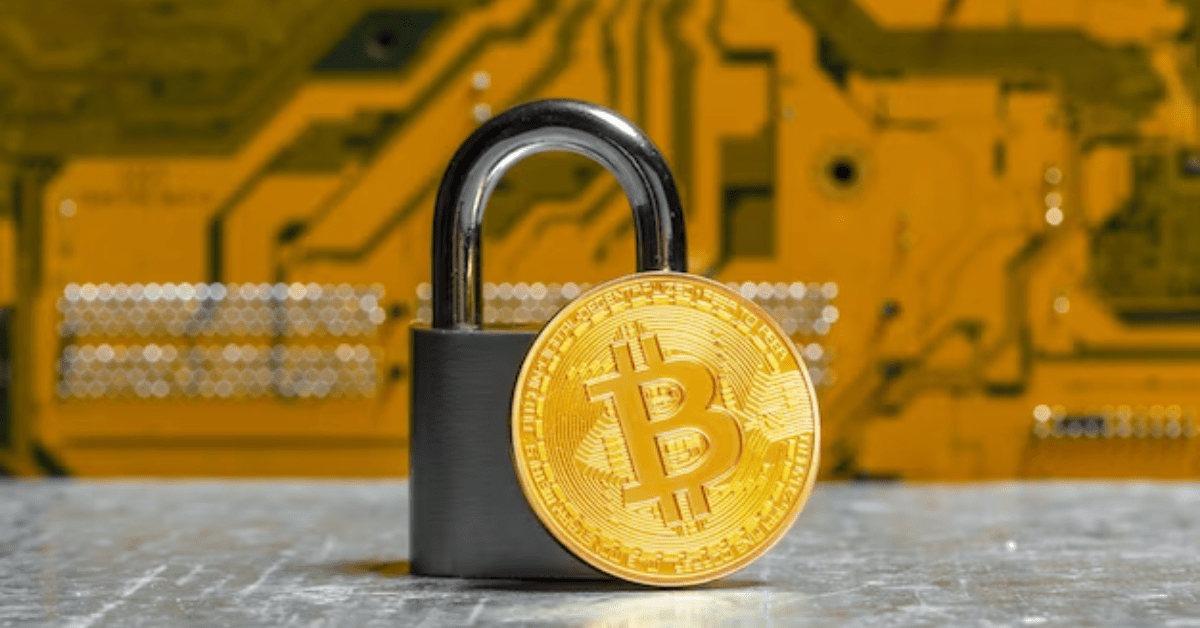what is cryptocurrency security?
The term “cryptocurrency security” describes the procedures and policies put in place to guard digital assets, like tokens and cryptocurrencies, against fraud, theft, and illegal access. Because cryptocurrencies are decentralized and based on cryptography, it is essential to safeguard these assets to avoid financial loss and to preserve user privacy.
Understanding The Risks
Understanding the risks associated with cryptocurrency is paramount before delving into security measures. Cryptocurrencies face a myriad of threats, including phishing attempts, fraudulent schemes, hacking incidents, and regulatory uncertainties. Unlike traditional financial systems, cryptocurrencies operate without a centralized authority overseeing transactions, placing the burden of asset protection squarely on individual users.
Phishing attacks, wherein malicious actors attempt to obtain sensitive information by posing as legitimate entities, pose a significant threat to cryptocurrency holders. Additionally, scams and Ponzi schemes targeting unsuspecting investors are prevalent in the crypto space. Moreover, the decentralized and pseudonymous nature of cryptocurrencies makes them attractive targets for hackers seeking to exploit vulnerabilities in exchanges or individual wallets.
Furthermore, unclear regulatory frameworks in many jurisdictions contribute to the risk landscape, as legal ambiguities may expose users to unforeseen legal consequences or regulatory actions. Being cognizant of these risks is essential for implementing effective security measures to safeguard one’s cryptocurrency holdings.
Tips For Cryptocurrency Security
- Secure Your Private Keys: The Foundation of Cryptocurrency Security
Securing your private keys is paramount for safeguarding your cryptocurrency holdings. These cryptographic keys are the foundation of your ownership and authority over your digital assets on the blockchain. It’s crucial to handle them with the utmost care to prevent unauthorized access and potential loss of funds.
Consider using hardware wallets as a secure storage solution for your private keys. Hardware wallets provide an additional layer of protection by storing your keys offline, thus mitigating the risk of exposure to online threats such as hacking or phishing attacks. With a hardware wallet, your private keys remain inaccessible to malicious actors, enhancing the security of your cryptocurrency holdings and giving you peace of mind knowing that your assets are safely stored.
- Use Hardware Wallets For Cold Storage
For enhanced security in cryptocurrency storage, consider utilizing hardware wallets for cold storage. These physical devices are designed explicitly for the offline storage of private keys, minimizing the risk of hacking and unauthorized access. By storing your keys offline, away from internet-connected devices, you significantly reduce the vulnerability to cyber threats.
Two popular options for hardware wallets are Trezor and Ledger, both renowned for their robust security features and reliability. These devices provide a secure environment for generating and storing private keys, ensuring that your cryptocurrency holdings remain protected from potential breaches or theft attempts. Additionally, hardware wallets often incorporate additional security measures, such as PIN protection and passphrase encryption, further fortifying the safety of your digital assets. By opting for cold storage with hardware wallets, cryptocurrency holders can enjoy peace of mind knowing that their funds are safeguarded against online threats and vulnerabilities.
- Implement Two-Factor Authentication (2FA)
Implementing Two-Factor Authentication (2FA) enhances security by necessitating users to provide a secondary form of verification alongside their passwords. This additional layer of protection fortifies defenses against unauthorized access attempts. For heightened security measures, enable 2FA across all your cryptocurrency wallets and exchanges.
To enable 2FA, typically, users need to download an authentication app like Google Authenticator or Authy, then link it to their accounts. Upon login, users are prompted to enter a unique code generated by the authentication app, in addition to their password. This code changes periodically, making it exceedingly difficult for malicious actors to gain access without physical access to the user’s authentication device.
By implementing 2FA, users significantly mitigate the risk of unauthorized access and enhance the security of their cryptocurrency holdings, reducing the likelihood of unauthorized transactions or theft.
- Choose Reputable Exchanges And Wallets
When selecting a wallet or cryptocurrency exchange, prioritize reputable and well-established platforms known for their reliability and security. Conduct thorough research by reviewing user feedback, assessing their track record in the industry, and evaluating the security measures they have in place to safeguard users’ assets.
Opting for unidentified or unreliable services can pose unnecessary risks to your cryptocurrency holdings. These platforms may lack robust security protocols, making them vulnerable to hacking or other malicious activities. Additionally, their lack of transparency and accountability could result in potential loss or theft of your digital assets.
By choosing reputable exchanges and wallets with a proven track record of trustworthiness and security, you can minimize the risk of encountering security breaches or fraudulent activities. Prioritizing safety and reliability in your selection process ensures that your cryptocurrency investments remain protected and secure.
- Regularly Update Software And Firmware
Regularly updating software and firmware is crucial for maintaining the security and performance of hardware devices, cryptocurrency exchanges, and wallets. Developers frequently release updates to address security vulnerabilities and enhance functionality, making it essential for users to stay current with the latest versions.
By installing updates promptly, users can benefit from the most recent security enhancements, which help protect against evolving threats and vulnerabilities. Additionally, updates often include bug fixes and performance optimizations, ensuring a smooth and reliable user experience.
Neglecting to update software and firmware leaves devices and platforms vulnerable to exploitation by cybercriminals. Hackers often target outdated systems with known vulnerabilities, making regular updates a critical aspect of cybersecurity hygiene.
Therefore, users should prioritize keeping their hardware devices, exchanges, and cryptocurrency wallets up to date by promptly installing available updates. Doing so helps mitigate security risks and ensures the continued integrity and security of their digital assets and personal information.
- Beware Of Phishing Attempts
Phishing remains a prevalent threat within the cryptocurrency industry, posing risks to users’ sensitive information and financial assets. It involves deceptive tactics wherein attackers impersonate legitimate entities to trick individuals into disclosing confidential data or performing malicious actions. To mitigate the risk of falling victim to phishing attempts, users must exercise caution when entering sensitive information online or interacting with digital communications.
It is imperative to verify the authenticity of emails, messages, and websites before taking any action. Users should refrain from clicking on links or downloading files from sources that cannot be verified as legitimate. By adopting a vigilant approach and scrutinizing all incoming communications and requests for information, individuals can better protect themselves against phishing attacks and safeguard their cryptocurrency holdings and personal data from unauthorized access and exploitation.
- Diversify Your Investments
Diversification is a fundamental principle in investment strategy, and it is equally important when dealing with cryptocurrencies. Rather than putting all your funds into a single cryptocurrency or platform, it’s advisable to spread your investments across multiple cryptocurrencies and wallets. This approach helps mitigate the impact of potential losses on any single investment.
By diversifying your cryptocurrency portfolio, you spread out your risk exposure and increase the likelihood of achieving more stable returns over time. Different cryptocurrencies may perform differently in various market conditions, so having a diversified portfolio can help you weather market volatility more effectively.
Furthermore, investing in multiple wallets adds an extra layer of security by reducing the risk of a single point of failure. In the event of a security breach or technical issue with one wallet or platform, your other investments remain unaffected.
Overall, diversification is key to managing risk and optimizing returns in the dynamic and evolving cryptocurrency market.
- Create Secure Backups
Creating secure backups is crucial for safeguarding your cryptocurrency assets. Regularly back up your wallet’s seed phrases and private keys to multiple secure locations. Consider using offline paper wallets or encrypted USB drives for storage. These methods ensure that your backup is protected from online threats. In the event of device failure or loss, having secure backups enables you to recover your assets swiftly and securely. Prioritize the security of your backups to mitigate the risk of losing access to your cryptocurrency holdings.
- Educate Yourself On Scam Tactics
To protect yourself from scams in the bitcoin world, stay informed about common tactics used by fraudsters. Be wary of schemes offering large returns through giveaways and avoid unsolicited emails or messages on social media. Exercise skepticism and conduct thorough research before engaging in any transactions or sharing personal information. The cryptocurrency sector lacks regulatory oversight, making it a prime target for fraud. By remaining vigilant and cautious, you can mitigate the risk of falling victim to scams and safeguard your assets in the volatile world of bitcoin.
- Secure Your Physical Environment
Securing your physical environment is paramount when it comes to safeguarding your cryptocurrency assets. To mitigate the risk of theft or damage, it’s crucial to keep your hardware wallets and backup devices in a secure location, preferably in a locked safe or another inaccessible area. Additionally, refrain from discussing your cryptocurrency holdings in public or on online forums where malicious actors may lurk.
By maintaining discretion about your holdings, you reduce the likelihood of becoming a target for theft or targeted attacks. Remember that the security of your cryptocurrency assets extends beyond digital measures and encompasses physical precautions as well. By implementing these practices, you can enhance the overall security posture of your cryptocurrency holdings and minimize the risk of unauthorized access or compromise.
- Understand Regulatory Compliance
Understanding regulatory compliance is crucial for individuals and organizations operating in any industry, including cryptocurrency. Staying informed about the regulatory landscape in your jurisdiction is essential to ensure adherence to local laws and regulations. Compliance not only shields you from potential legal consequences but also demonstrates a commitment to operating ethically and responsibly within the industry.
In the cryptocurrency space, where regulations can vary significantly from one jurisdiction to another, keeping abreast of regulatory developments is paramount. This includes staying informed about licensing requirements, tax obligations, anti-money laundering (AML) and know-your-customer (KYC) regulations, and other relevant laws governing cryptocurrency transactions and activities.
Bottom Line
Security is really important in the constantly evolving world of cryptocurrencies. You can drastically lower the risks involved in owning and trading digital assets by putting these best practices into practice. Adopting proactive steps will enable you to securely traverse the cryptocurrency landscape, from safeguarding your private keys to being watchful for phishing attempts.





